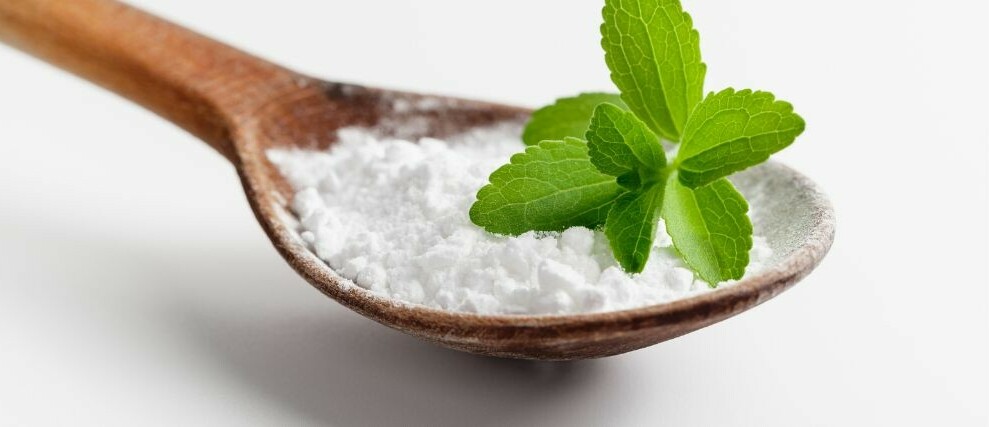The pros and cons of Stevia – are there actually any “cons?” There might be a few, we’ll take a look, but there are definitely a lot of pros! We’ve talked about stevia in previous posts, but recently I saw an article about it in Nutrition Insight that brought it back to mind.
Sugar – that old friendly kitchen staple that has been around since “forever,” has come up lacking on the health front in many significant ways. In an article I read recently, an expert proposed the thought that sugar is pretty much the one guaranteed way to get diabetes – if you want diabetes – which I’m sure nobody does. So any alternatives that don’t carry with them too many other and different negatives can’t help but be a huge health plus.
While scientists have come up with many sugar substitutes, stevia is one of the most natural. It is made from the leaves of the Stevia rebaudiana plant, which is naturally sweet.
While you can buy pure stevia extract, much of the stevia you will find on normal grocery store shelves has a base of either dextrose or sugar alcohol in one form or another.
The Cons of Stevia
Let’s look at the cons first, then we get those out of the way. Here are a few:
- It can have a bitter aftertaste. Personally, the stevia that I used several years ago had more of a bitter aftertaste – unless I’ve just gotten used to it. Now – I use it all the time, and don’t notice any. But everyone’s tastes are different!
- The way it’s processed. All stevia is processed in some way or another; you won’t likely find stevia leaves in the grocery store! But how the stevia is processed and to what degree it is processed can vary. It would stand to reason that the less processed the product is, and the fewer fillers have been added, the better.
- Possible digestive/allergy issues. Some people have experienced bloating, gas, and diarrhea from stevia. A very few people who have allergies to ragweed or chrysanthemums might have allergies to stevia.
The Pros of Stevia
I personally think stevia mostly has pros! Here are some:
- No calories! So if you are counting calories, you don’t have to count stevia. No matter how much you use! So you can have as much sweetness as you wish. If you were using sugar, honey, or maple syrup, you would have to count the calories. Extra sweetness, no extra calories!
- No effect on glycemic index. Stevia has virtually no effect on blood sugar levels; clearly that does not apply to sugar. So if you’re diabetic, or pre-diabetic, or just want to keep glucose in your body to a minimum, to prevent cancer, or whatever…stevia is your friend! If you’re eating a low-carbohydrate diet or a keto diet – you can still use stevia.
- Stevia comes from natural sources. For anyone who wants to eat “natural,” stevia is natural. It comes from the leaves of the stevia rebaudiana plant, which grows in South America. For that matter it grows in North America, as well; we used to have a plant outside our door in Manitoba, Canada, and it grew very well! It’s one of the few non-caloric sweeteners than can lay claim to the word “natural.” Most of the others – aspartame, sucralose, sodium cyclamate, saccharin – are chemicals.
- It is non-cariogenic. What does that mean? It doesn’t create cavities. It’s dental-friendly. You will never go to the dentist and have him/her say to you: “You’ve got to stop eating so much stevia, your teeth are in terrible shape!” Not going to happen – unless the dentist is very unknowledgeable.
Is Stevia Budget-Friendly?
Ummm…well…it’s actually one of the higher-priced sweeteners. I dunno, I personally think the people who market foods capitalize on the fact that people want healthy, and charge a premium. You go to a store, and on the shelf in the sweetener section, sugar is the cheapest, followed by aspartame, then sodium cyclamate (if you’re in Canada), then sucralose, and – at the top of the price charts – stevia products. So no, it’s not going to be as inexpensive as sugar, but just like with most things, you can be wise and get it as cheaply as possible. Here are some suggestions:
- Use it sparingly. Stevia is sweeter than sugar, so you will not likely need as much to get the same level of sweetness in your food.
- Compare brands and stores. We have found here in Manitoba, Canada, that one of the supermarkets that we consider an expensive place to buy food in general, actually has the least expensive stevia! Also, there are usually both generic and name brand versions, and as with most foods, generic/”no-name” is generally cheapest. The big names in sweeteners have all gotten into the stevia field; Sugar Twin and Splenda both have stevia products. While there is pure stevia, most of the stevia on the market is either has dextrose or a sugar alcohol as a additive. The amount of either substance that you will get in a pack of stevia is negligible, but the “dextrose”-based stevia products are generally cheaper than the sugar-alcohol-based products – or so we’ve found.
- Buy in bulk. If you have the opportunity to buy stevia “loose” – that is, not in the little packets, it seems it could be cheaper. Of course, then you have to be careful you don’t just dump a lot in, you will need to measure it out appropriately.
Conclusion
Personally, I believe using stevia rather than sugar, or even most other less-natural low-calorie sweeteners is worth the cost. That’s why I use it all the time!
If you have any questions or comments about the subject matter in this post, please feel free to share in the comments section below.

